Los Angeles
Rep. Katie Porter and trans actor Angelica Ross talk COVID-19 money in Equality California fundraiser
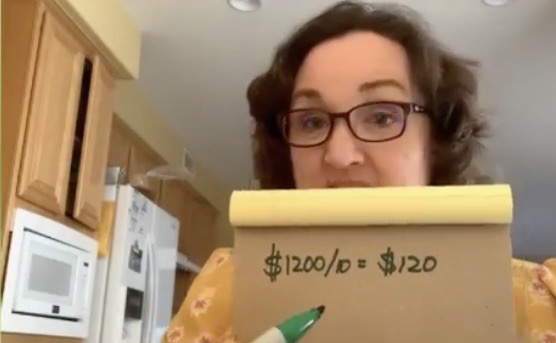

Equality California has almost an impossible task: rallying LGBTQ voters to help pro-equality Democrats retain the House, win back the Senate and oust the most incompetent, damaging president in U.S. history – while still keeping the organization afloat amidst a global pandemic and financial meltdown.
Several progressive politicos and celebrities understand the grave difficulty existing in the new COVID world and showed up for EQCA’s online “Evening for Equality,” hosted by WeHo fan favorite Queer Eye Culture guy Jai Rodriguez. Despite the awkward rigors of physical distancing, Sen. Tammy Baldwin, Reps. Adam Schiff, Katie Porter and Ted Lieu, and activists Chasten Buttigieg, Angelica Ross, Stephanie Miller, Pauley Perette, Margaret Cho, Daniel Franzese, Ariana Madix, Tom Sandoval and Billie Lee showed up in solidarity and Jason Mraz and CeCe Peniston lent support through song.
The show, which was produced with the kind of homey familiarity now common during the novel coronavirus physical distancing crisis, Equality California raised nearly $25,000 in donations ranging from $5 to $5,000, with more donations still coming. That’s in addition to the nearly $150,000 raised in the last two weeks.
As a contribution to the community, EQCA is offering to share what they learned about putting on a virtual fundraiser with smaller non-profits facing the same need to raise money in a new way.
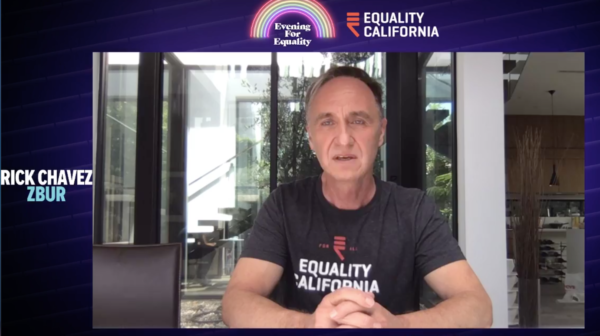
Equality California Executive Director Rick Chavez Zbur during EQCA event
“This is new territory for us — as it is for everyone — and I’m so grateful to the community for joining us and to so many of those who tuned in for stepping up and supporting our work,” Equality California Executive Director Rick Chavez Zbur told the Los Angeles Blade. “Like all nonprofits, we’re struggling right now, but we’re working to adapt to this new environment. Our goal was to provide some uplifting entertainment and engaging discussions, as well as an opportunity to come together virtually as a community. It was a success. We don’t necessarily have all the answers about virtual fundraising events, but we are committed to supporting other nonprofits that serve the LGBTQ+ community too, so we look forward to sharing some of the lessons we learned with our colleagues at partner organizations.”
Rodriguez opened as if he was engaged in a one-on-one with hundreds of fans and friends on his We Are Channel Q radio show. He laughed off a screwed up introduction that set the easy earnest tone for “live” from everyone’s comfortable Zoom-room.
Rodriguez set the tone but the leaders of Equality California and the Equality California Institute Board of Directors set the messaging.
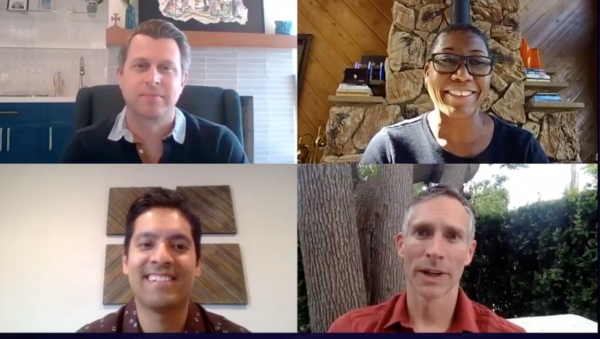
Joe Gregorich, Jackie Thomas, Scott Malzahn, Juan Camacho, Leadership for Equality California and the Equality California Institute Board of Directors.
“Our LGBTQ+ Community has been hit hard financially from this crisis and Equality California is a nonprofit organization that services our community is no exception,” said Scott Malzahn. “But tonight we’re choosing hope over fear.”
Trans actor and influencer Angelica Ross took over, not just introducing Rep. Katie Porter but joking about how Porter has become a viral super star through her sharp questions during congressional hearings.
Their instant connection and respect was moving, informative and illustrative of how to have a smart, engaging conversation that is also funny and entertaining.
“I loved your hilarious takedown on [Housing and Urban Development Sec.] Ben Carson not knowing the difference between an REO [‘real estate owned’ property] and an Oreo [cookie]. So, we have a question from one of our audience members, Michael from Laguna Beach, wants to know: were you born fierce or did something or someone make you that way?”
Speaking comfortably from her kitchen, Porter said she didn’t necessarily think of herself as fierce until the opportunity presented itself. However, family photos show that she was a “fairly strong-willed child.”
Porter’s also experienced the adversity “that made me realize that there are real harms going on in this society and that we have to look straight on at them, call them out and be willing to commit to fixing them. And so, I grew up during the farm crisis, I watched people lose their farms and their homes and I listened to Californians during the foreclosure crisis, losing their houses. And I was there to help lift up their voices and help them be successful and make ends meet and hang on to their house.”
Porter determined to run for elective office to “fix America,” she said. “So, I think I’m fierce because I care fiercely about this, about what we’re doing, and I want to actually get things done.”
Ross noted that unfortunately, other people “seem to be in it for other reasons that aren’t for the greater interest” of the people. She shifted not so subtly to Porter’s vanquished 2018 far right Republican opponent, Mimi Walters. The GOP wants that seat back in 2020.
“So, this district is still a Republican majority district, although we’ve made a lot of great progress with the help of Equality California and other groups in reaching out to folks and engaging voters,” said Porter. “But it’s still 2% more Republicans than Democrats. And virtually, all of my local elected and county elected officials are Republicans. So, I do have to really think about how can I connect with and communicate across party lines?”
Porter explained that she uses her previous position as a law professor at University of California, Irvine specializing in the Uniform Commercial Code to respectfully listen to questions, learn about constituents lives and challenges and then “trying to teach other people why we need to make this change in policy,” she said. “I think I love that element. I love that back and forth,” giving a shout out “to all the students who didn’t do their homework for preparing me to know how to take down witnesses who were ‘yahoos.’”

Ross, who exclaimed that she loves the Uniform Commercial Code, pointed out how the COVID-19 crisis has dramatically impacted the LGBTQ community.
“More than one out of five trans adults have at least one or more chronic conditions like HIV, diabetes, arthritis or asthma. I have asthma,” Ross said. “Fear of discrimination keeps many of us from going to the doctor and many of us work in the gig economy or other industries impacted by this economic fallout.”
Porter said she’s trying to address the disparities, having just sent a letter to the FDA “asking them to expedite the approval process that’s needed to implement the new rule that they pass the blood donations for men who have sex with men,” noting that the pandemic is causing a national blood shortage and science doesn’t support the FDA policy.
Porter also noted that May is the 12-month anniversary for the House passage of the Equality Act, which Senate Majority Leader Mitch McConnell refuses to bring up for a vote.
“It’s not enough to just pass these laws and give people symbolic victories. Equality is an abstract ideal, but it’s also something that manifests in people’s real lives,” Porter said. “And so they need these actual protections from unemployment, in public housing and education. And with this widespread labor market disruption with the pandemic and people losing housing, it is going to be more important than ever to have these protections in place as people have to seek new jobs and find different housing and the economic dislocation of this whole situation.”
Porter confessed that she got choked up and “a little teary” during the hearing on “the administration’s assault on religious liberty and LGBTQ rights” as a number of people talked about barriers to LGBTQ people adopting children or fostering children.
“One of my Republican colleagues — shortly before it was my turn to question — went on a little bit of a rant and rave about nontraditional families, that two-parent households are a family and these other things are not families,” Porter said. “And I don’t have any of their real life experiences that LGBTQ, trans people — I don’t walk in your shoes every day — but he literally erased my existence as a single parent. And what was he suggesting? That my children and I are not a family? I assure you. We are a family. We live together, we love each other. That is a family.
“And so it was important for me to push back at that moment because I’m so frustrated and exhausted with other people trying to impose their definition of family, their definition of love, their definition of wellbeing onto other people,” Porter said. “So, I was grateful for the opportunity to push back on that.”
Porter then turned the tables and asked Ross a question.
“A lot of people know you from your role as Candy on “Pose” or Donna Chambers on “American Horror Story,” but you’re also a very active advocate for trans equality,” Porter said. “And you are — I have this right, I’m so awed by this — you are a self-taught coder,” which resulted in Porter gushing over Ross as the real “bad ass” between them, asking about her firm helping trans people, TransTech Social Enterpries.

Ross first introduced her dog Hammer, a long-haired Chihuahua, confirming that she’s a self-taught coder with the goal of leveling the playing field around access and skills.
“I started with those simple codes of HTML and CSS and I took those skills and then started doing content management systems like WordPress and Drupal and Joomla,” Ross said. “And I started charging clients to build these small websites, content management sites. But the coding was a little bit beyond — there was more to learn. And so, what I did was build a business around building websites and hiring other people to do the more advanced coding.”
Ross went deeper:
“I wanted to make it clear that when I say tech, yes I mean coding, but I also mean being able to be a beauty influencer and run a YouTube channel, being able to be a photographer or do photo retouching. I have a lot of fans and a lot of people from the community who love the show ‘Pose’ and who keep thinking, ‘Well, how can I get started as an actor and how can I get involved?’ And one of the things that I always teach folks is how to make yourself a valuable asset to the industry because you love it.
So, not just wanting to be in front of the camera, but how can you make yourself valuable to the project? Can you run lights? Can you be a grip or a PA, a hairstylist or a makeup artist? So, what we do is we have an online and offline community. We meet in back channels and we help each other prepare for interviews. We share job leads, we help each other find freelance jobs. And then once a year, we have what we call the ‘Transect Summit,’ which happened two years in a row at the Groupon Headquarters in Chicago.
But since Covid-19, we’re taking it all online and we’re expanding it to be global. So we’ll have over 50 workshops worldwide over two days. And it’s going to be all free to … Our sponsors are going to help us make it free, but it’s going to be free for everyone to attend.”
“This Covid-19, if it hasn’t shown us anything else, it showed us all the things that people said were impossible are all of a sudden possible,” said Porter. “Look at that, us being innovative on how to connect.”

Ross asked Porter to use her famous whiteboard to explain the “absurd” confusion with the $1,200 stimulus check, as explained by Treasury Secretary Steve Mnuchin.
The whiteboard was unavailable so Porter went old school.
“Okay. So $1,200 divided by the 10 weeks that he’s estimating — and by the way, we’re going to be continuing to suffer for a lot more than 10 weeks, one, because we don’t have the virus under control but two, we don’t know when we’re supposed to get back —
So that works out to $120 additional dollars per week, if you assume this lasts 10 weeks. Then, when you step up California, even with the expansion of an additional $600 a week — which is a lot of extra on top of what California did, somebody in California — the maximum unemployment that you could get is $4,500 a month.
So again, if you go back to doing that a week, that’s the 10 weeks, this is over a month, you’re going to get two and a half, you’re going to come out to about a thousand dollars a week.
All right, so we’re being asked to live on about $1,200 a week — this works out to about $4,800 a month.”
Porter then explains why $4,800 a month is difficult to live on it California:
“The typical rent is going to easily subsume well more than 50% of that money. And rent is not something that people can do without, it’s not an easy expense to change. And so people are going to be spending half that money right off the top in rent.
And then that leaves them with $2,400 a month. And then you start figuring in things like food. And so when I walked [JP Morgan CEO] Jamie Dimon through all of this [in April 2019], I walked him through a budget for one adult and one child. And so the minimum food budget for that, if you ate Ramen Noodles, would take you down to over $400 a month. And then you start thinking about things like childcare. If you have one child and you’d be down even further. So, the bottom line is this is not going to be enough money.”
And the money mangers haven’t really done the math so they don’t understand “the challenges that working families face.”

The entire event was entertaining and informative, including “radio nerd” Stephanie Miller’s interview with House Intelligence Chair Adam Schiff, “congressional rock star who is clearly desperately in need of a drive-by hairdressing from some of the fabulous gay men in the audience tonight. Chairman, I know your daughter gave you your haircut and it does, it looks fine and your neck looks less like a pencil than ever. And I just say, I don’t care what the president says.”
Miller then asks if it’s OK to open with a gay joke for the gay event, to which Schiff responds, “I would welcome that.”

“My quarantine crushes, chairman, are currently the prime minister of New Zealand, the prime minister of Finland, and the prime minister of Iceland. It’s the first time in my life I’ve ever liked women with really flat curves. Said it because they flattened the curve. You see, because they believe in facts and science, and that’s hot. Is this on? Chairman, isn’t that true that we are doing the worst, probably, of any country in the world in flattening this curve?” Miller asked.
“Well, we have the most infections of anywhere in the world and we have, by far, the most deaths of anywhere in the world. And yet somehow the president and Jared Kushner think we’re doing just great and they’re very proud of our death total, as the president said today. I don’t even know what that means, except for those that have lost loved ones, it’s just additional salt in very open and painful wounds,” Schiff said. “But Stephanie, you’re right, the women leaders are doing really well, not a surprise. And we have to follow their example.”
Miller talked to Schiff about how his “brilliant speeches during the impeachment have come true,” how Trump has “brought us literally a Vietnam and a Great Depression in the space of six weeks, he has brought this country to its knees” and how the LGBTQ community, in particular, is hurting disproportionately without the Equality Act. “Everything under Trump is worse; racism, sexism, homophobia, all marginalized groups are having a harder time,” said Miller.
“It’s so true. And even now, during the midst of this pandemic, what is the administration doing? It is trying to roll back protections in the healthcare system to prevent discrimination against LGBTQ individuals,” said Schiff. “Right now, they are promulgating new regulations to repeal Obama era protections. It’s just awful. As it is, about one out of every 12 LGBTQ Americans gets turned away from healthcare because of their orientation or because of their gender identity. And so, the last thing we ought to be doing is going backward.

“But one thing I think this pandemic is revealing,” Schiff continued, “is when we get through it, we need to build back better. We need to build a more just more equitable, less discriminatory society than the one we have going into this pandemic.
“But while it goes on, we particularly need to make sure that we meet the healthcare needs of the most vulnerable. Communities of color are being devastated right now. 80% of the casualties in Georgia are African Americans,” Schiff said, “and when you take those in the African American community who were also LGBTQ, the potential for discrimination and the most severe of health consequences is even that more profound.”
They two reminded viewers about the importance of voting by mail and getting tested for COVID-19. “You know that your patriotism makes me go from gay to questioning every time I interview you, Chairman,” Miller said in closing.
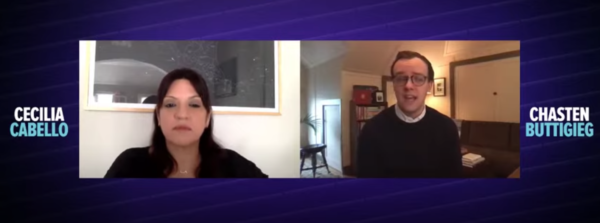
Cecilia Cabello, California Chair for former South Bend, Indiana Mayor Pete Buttigieg’s presidential campaign, interviewed the former mayor’s husband, Chasten. He joked how he was home with the dogs and how he was happy the house was split level so he could “get away” from Mayor Pete if he needs to.
But the thrust of Chasten Buttigieg’s interview was about how the coronavirus quarantine is impacting schools, which have been “a safe space for LGBTQ students, something they looked forward to.” Chasten said he is “a little worried” about how schools are adapting and how to give them a safe, warm and welcoming environment both digitally and virtually.
“Right now students are facing a community that is going through a lot of change and sometimes that means that schools aren’t willing to catch up to the change that we’re making as a society, especially with a public schools rolling back a lot of those Obama-era protections,” Chasten Buttigieg said. “Kids have to deal with a lot,” including hostile teachers and unsafe environments in school and home.
“40% of homeless youth in our country identify as LGBTQIA. So, there are a lot of issues facing young queer people in our country, said Chasten Buttigieg. “It’s important in all those spaces we make sure that they are safe and affirming.” Unfortunately, he added, “we have a lot of work to do there.”
Watch the one hour-forty minute Equality California event online.
Los Angeles
AIDS Healthcare Foundation will celebrate its legacy of food relief at the New Year’s Rose Parade
This Thursday, AHF will march at the Rose Parade in celebration of its “Food for Health” program: an initiative that has fed community members in need for five years.

This Thursday, the AIDS Healthcare Foundation (AHF) will march in the highly-anticipated Rose Parade in Pasadena. AHF will present a Jack and the Beanstalk float with the titular character climbing amongst ginormous tomatoes, eggplants, strawberries, and tomato plants. It’s befitting of this year’s parade theme: “The Magic in Teamwork,” which celebrates the power of collective effort and unity.
The whimsical design also honors the organization’s “Food for Health” program, an initiative that began in 2021 to respond to food insecurity across the U.S. For nearly five years, “Food for Health” has hosted free food pantries and farmers’ markets, providing hot meals and fresh groceries nationally for families and veterans in need of food assistance.
“Food for Health” was also crucial in the wide-sweeping emergency response various nonprofits were trying to organize after the devastating Palisades and Eaton Fires in January. AHF’s program delivered over 75,000 hot meals to evacuees and Los Angeles Fire Department (LAFD) first responders.
The float also honors the individuals fueling these on-the-ground efforts, like Janet and Christy Lee, the sisters behind Altadena’s Fair Oaks Burger. For eight months after these major fires broke out, the Lee sisters worked closely with “Food for Health” to host free weekly farmers’ markets in the parking lot of their restaurant to support community members who had been displaced and impacted by the wildfires.
Both sisters will join fellow local advocates and leaders like labor activist Dolores Huerta, LAFD Captain Thomas ‘Kit’ Kitahata, Champions of Caring Connections executive director Bettye Randle, and “Food for Health” directors Carlos Marroquin and Tara O’Callaghan as riders on the AHF float.
The Rose Parade begins at 8 a.m. on Thursday morning, marching through 5 miles of Colorado Blvd. Now in its 137th year, the parade’s inaugural event was held in 1890 and continues to delight local residents and usher in the new year with illustrious musical performances and grand floats. More information about tickets and parade guidelines can be found on Pasadena’s Tournament of Roses website.
Kristie Song is a California Local News Fellow placed with the Los Angeles Blade. The California Local News Fellowship is a state-funded initiative to support and strengthen local news reporting. Learn more about it at fellowships.journalism.berkeley.edu/cafellows.
Los Angeles
Recent L.A. County report reveals record number of hate crimes against transgender and nonbinary community members
The county’s Commission on Human Relations (LACCHR) released its annual hate crime analysis, revealing a rising violence against LGBTQ+ Angelinos.

Last Thursday, Los Angeles County’s Commission on Human Relations (LACCHR) released its 2024 Hate Crime Report, which analyzes data compiled from over 100 reporting groups, including local law enforcement agencies, educational institutions, and community-based organizations like the TransLatin@ Coalition. In its 45-year history of compiling these reports, the LACCHR recorded an “unprecedented” amount of hate crimes in this most recent analysis.
The report states that there were 102 anti-transgender crimes, “the largest number ever documented in this report.” 95% of these reported incidents were violent.
Part of the reason for this increase in reported crimes is the expanding outreach LACCHR is trying to create with partner organizations, ensuring that queer community members feel increasingly safe in reporting crimes that have been committed against them. These “grassroots efforts” have proven invaluable in building community trust, according to Dr. Monica Lomeli, who leads the production of LACCHR’s annual hate crime report.
“For the LGBTQ community, [there’s] a history of not being heard, not being believed or being misgendered,” Lomeli told the Blade. “I remember us working with a lot of different law enforcement agencies [and] victims would tell us: ‘They keep misgendering me. They don’t believe me. They keep having me make different reports.”
Lomeli stresses that, for those who feel unsafe reporting hate crimes to law enforcement agents, there are other options. One of these pathways is the commission’s community-centered initiative and reporting system, LA vs Hate, which allows people to report hate crimes and access resources like multilingual reporting guides. There is also 211 LA, a program funded by the commission that provides free, confidential support in 140 languages.
The report is instrumental to the formation of initiatives focused on queer safety and is also a resource to various LGBTQ+ organizations as they track violence committed against their community members. But the collection of this data has not been smooth, especially in this current administration.
Lomeli explained that, earlier this year, the now-defunct Department of Government Efficiency (DOGE) reached out to various human rights organizations, including the LACCHR, and was aiming to gain access to and shut down the commission’s hate crime database. “There was an attempt to bring down our data,” said Lomeli, who described these attempts as an infringement on the general public’s ability to access the report’s findings.
Moving forward, the commission’s Network Against Hate Crime, which hosts quarterly meetings with leaders from law enforcement agencies, advocacy groups, educational institutions, and social services providers, will hold a briefing on the report and discuss collaborative solutions to support community members.
Lomeli hopes to bring LGBTQ+ issues to the “forefront” of one of these upcoming meetings, given the high number of hate crimes committed against queer community members that were highlighted in the report. LA vs Hate will also continue to host campaigns, marketing efforts, and awareness events to promote the equitable treatment and safe existence of queer and other marginalized Angelinos.
Kristie Song is a California Local News Fellow placed with the Los Angeles Blade. The California Local News Fellowship is a state-funded initiative to support and strengthen local news reporting. Learn more about it at fellowships.journalism.berkeley.edu/cafellows.
Los Angeles
LGBTQ+ community calls out Radio Korea over host’s homophobic comments; station acknowledges but skirts accountability
On Nov. 3rd, Radio Korea host Julie An claimed that “gay people began the spread of AIDS” on a talk show broadcast by the station.
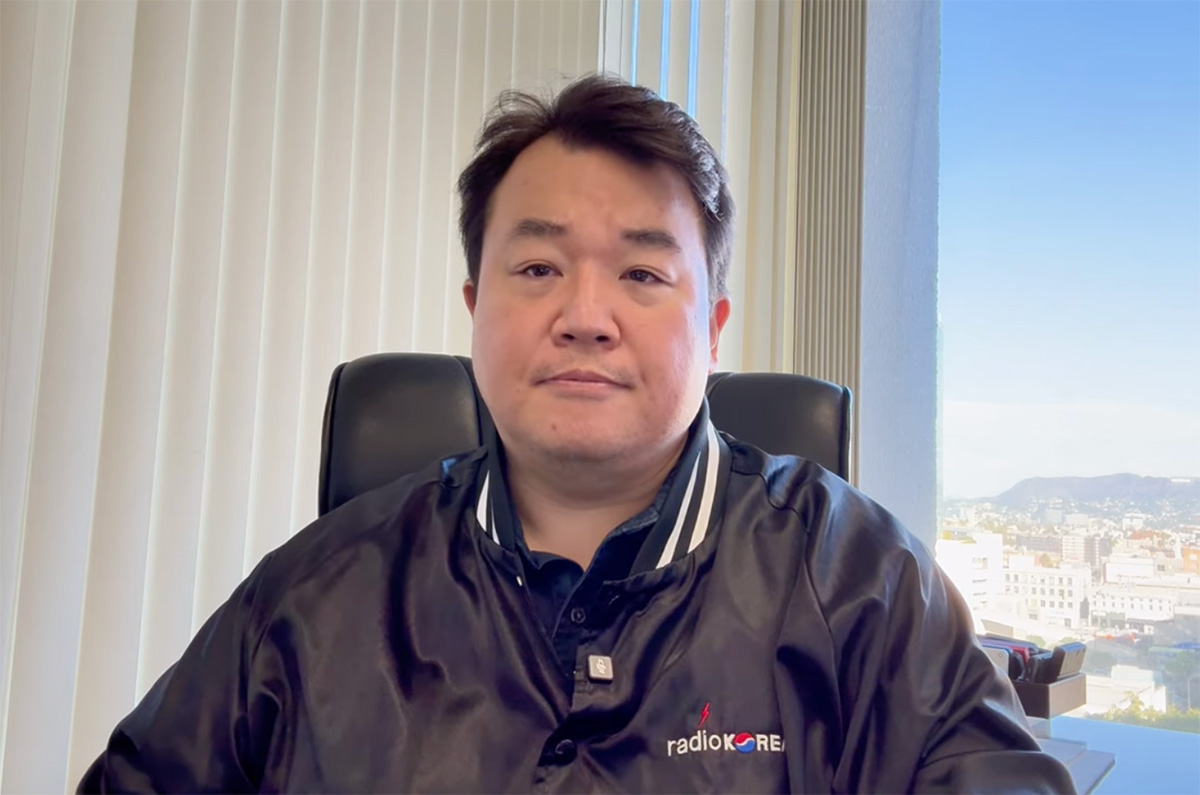
On Monday, Nov. 3rd, Radio Korea aired its regular morning talk show program, where one of its hosts, Julie An, discussed her lack of support for the LGBTQ+ community, citing her religious beliefs. She also went on to comment that gay people spread HIV and AIDS, and that conversation therapy — which has been linked to PTSD, suicidality, and depression — is a viable practice. Clips of this have since been taken down.
Radio Korea offers Korean language programming to engage local Korean American and Korean immigrant community members. Its reach is broad, as Los Angeles is home to the largest Korean population in the U.S, with over 300,000 residents. As An’s words echoed through the station’s airwaves, queer Korean community members took to social media to voice their concern, hurt, and anger.
In a now-deleted Instagram post, attorney, activist, and former congressional candidate David Yung Ho Kim demanded accountability from the station. Writer and entertainer Nathan Ramos-Park made videos calling out Radio Korea and An, stating that her comments “embolden” people with misinformation, which has the ability to perpetuate “violence against queer people.”
Community health professional Gavin Kwon also worries about how comments like An’s increase stigma within the Korean immigrant community, which could lead to increased discrimination against queer people and their willingness to seek health care.
Kwon, who works at a local clinic in Koreatown, told the Blade that comments like An’s prescribe being gay or queer as a “moral failure,” and that this commonly-held belief within the Korean immigrant community, particularly in older generations, strengthens the reticence and avoidance clients hold onto when asked about their gender or sexual orientation.
“When you stigmatize a group, people don’t avoid the disease — they avoid care,” Kwon explained. “They avoid getting tested, avoid disclosing their status, and avoid talking openly with providers. Stigma pushes people into silence, and silence is the worst possible environment for managing any infectious disease.”
For weeks, Radio Korea did not offer a direct response to the public criticism. Its Instagram feed continued to be updated with shorts, featuring clips of its various hosts — including An.
On Friday, Radio Korea CEO Michael Kim released an official statement on the station’s YouTube page. In this video, Kim stated that An’s comments “included factual inaccuracies” and that the station “does not endorse or share the personal opinions expressed by individual hosts.” Kim also stated that Radio Korea “welcomes members of the LGBT community to share their perspectives” in order to deepen understanding through dialogue.
Afterwards, Kim continued that though he acknowledges the “pain” felt by queer community members, he concluded: “I don’t think Radio Korea needs to apologize for what was said any more than Netflix should apologize for what Dave Chappelle says, or any more than Instagram or TikTok should apologize for what people say on their platforms.”
Kim then offered a justification that An’s statements were “not part of a news report,” and that he was “disappointed” that David Yung Ho Kim, specifically, had been vocal about An’s comments. Kim stated that he was the first person to interview David in 2020 during his congressional campaign, and that he had provided the candidate a platform and opportunity to educate listeners about politics.
“After all these years, the support Radio Korea has given him,” said Kim, “the support I personally gave him, even the support from other Radio Korea members who donated or even volunteered for him — he dishonestly tried to portray Radio Korea as being an anti-gay organization.”
Kim went on to criticize David’s purported “hurry to condemn others,” and also questioned if David has disowned his father, who he states is a pastor. “What kind of person is David Kim, and is this the kind of person we want in Congress?” Kim asked viewers, noting that Koreatown is “only about three miles from Hollywood, and some people just like to perform.”
At the end of the video, Kim stated that his duty is to guard the legacy of the station. “My responsibility is to protect what was built before me and ensure that Radio Korea continues serving this community long after today’s momentary controversies disappear,” Kim said.
For community members and advocates, this response was unsatisfactory. “The overall tone of the statement felt more defensive than accountable,” Kwon wrote to the Blade. “Instead of a sincere apology to the LGBTQ+ community that was harmed, the message shifts into personal grievances, political dynamics, and side explanations that don’t belong in an official response.”
Kim’s portrayal of the criticism and calls to action by community members as a “momentary controversy” paints a clearer picture of the station’s stance — that the hurt felt and expressed by its queer community members is something that will simply pass until it is forgotten. An continues to be platformed at Radio Korea, and was posted on the station’s social media channels as recently as yesterday. The station has not outlined any other action since Kim’s statement.
Kristie Song is a California Local News Fellow placed with the Los Angeles Blade. The California Local News Fellowship is a state-funded initiative to support and strengthen local news reporting. Learn more about it at fellowships.journalism.berkeley.edu/cafellows.
Los Angeles
Forgetting queer pioneer Morris Kight is “impossible”: Advocates and friends share stories at remembrance
On Saturday, Nov. 22nd, Kight’s ashes were interred at Hollywood Forever Cemetery.
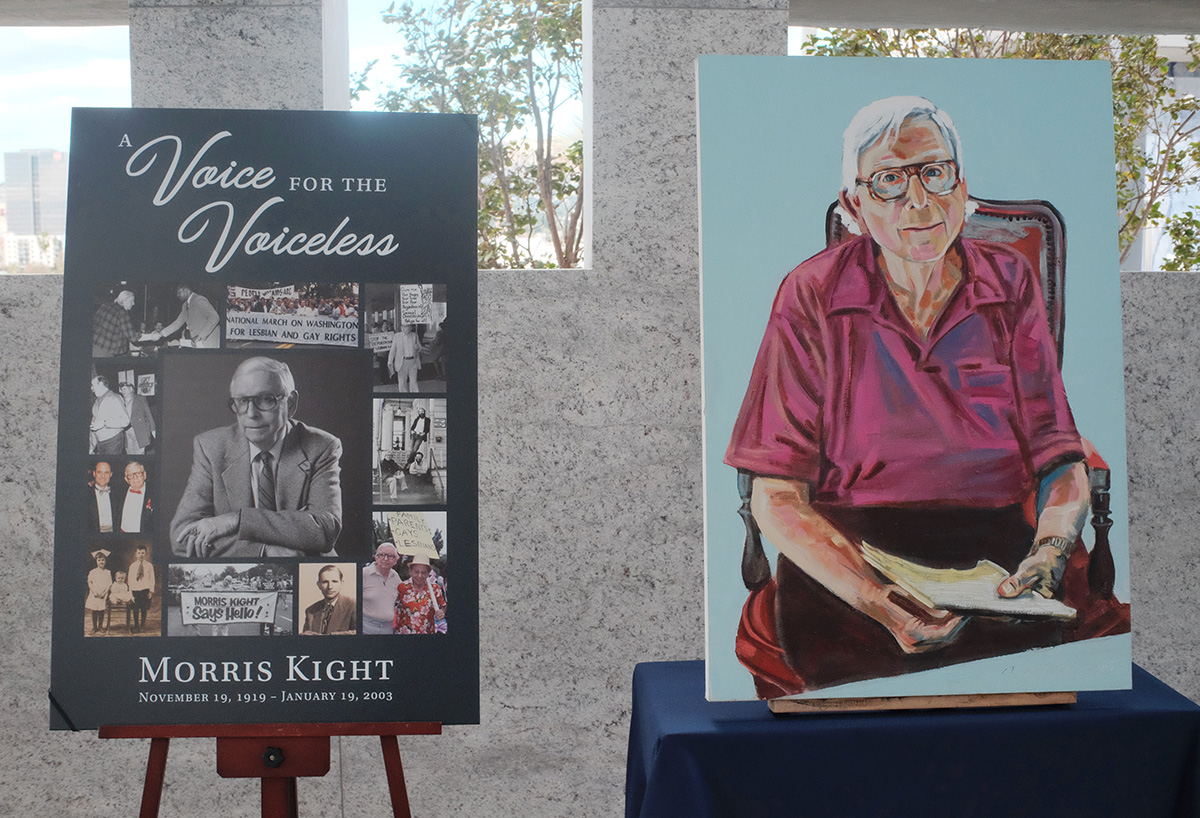
Over 50 people made their way to the rooftop chapel at Hollywood Forever Cemetery’s Gower Mausoleum on Saturday afternoon, taking in sweeping views of the city as a gentle wind began to envelop the space — a wind that some thought signaled the presence of Morris Kight. Hosted by local nonprofit AIDS Healthcare Foundation (AHF), this reception provided longtime friends, fellow activists, and anyone else impacted by Kight’s legacy with the opportunity to share some of their most memorable stories about the LGBTQ+ vanguard.
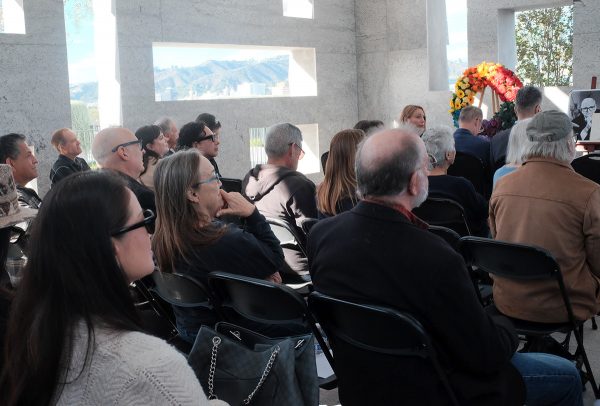
Kight died on January 19, 2003, after decades of leading peaceful, bold, and outspoken action against oppressive systems that targeted marginalized communities. As Congresswoman Maxine Waters declared at the remembrance event: “You have to be a hell of somebody to be memorialized 22 years after.”
Kight co-founded the Los Angeles LGBT Center in 1969, first known as the Gay Community Services Center, where so many queer youth and adults found the courage and empowerment to seek education, resources, and comfort. It became the place where they could fully embrace themselves.
At 19, AHF president Michael Weinstein found himself at the front steps of the Center, afraid but compelled. This is where his and Kight’s lives would intertwine, setting him on his own path of liberatory leadership. This first encounter and relationship “cemented” his identity, Weinstein told the crowd, after an arduous search for belonging and internal understanding.
The impact Kight had on Weinstein and innumerable other queer folks was not just a consequence of his work, but the purpose for it all. “We were his payment. We were his reward,” said Miki Jackson, Kight’s longtime friend and another instrumental voice in early LGBTQ+ movements. “Morris cared that we were loud enough, we were out enough, we were visible enough that a child in Kansas in elementary school would know about it. He cared about where people were wounded the most.”
Kight projected his voice in hopes it would reach those who were silenced, becoming the face of several important movements, including the Gay Liberation Front. He raised money for people with AIDS, co-founded the Stonewall Democratic Club, and pushed for L.A.’s first pride parade in 1970 — unabashedly fighting for the visibility of LGBTQ+ people as they were met with societal violence and rejection.
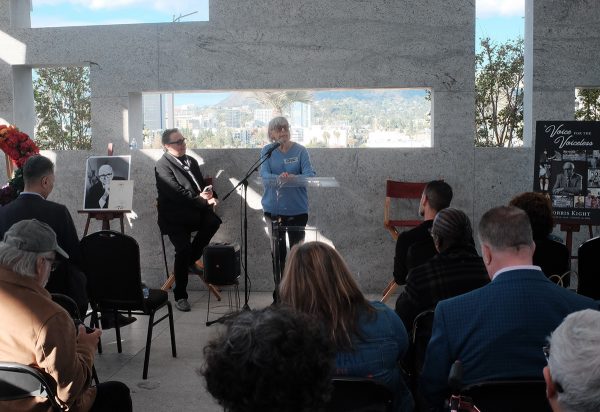
“The idea of forgetting a Morris Kight is basically impossible,” said Terry DeCrescenzo, one of the founders of the Gay Academic Union. She recounted fond memories with Kight, including a story tied with her roots of protesting. Together, they blocked the streets of Sunset and Larrabee and sang the civil rights anthem “We shall overcome.” At first, DeCrescenzo was in disbelief. “I thought, ‘I went to Catholic school for 17 years to sit on the sidewalk singing We shall overcome?’ And the answer is yes. He showed me a way of doing things — of approaching life — that I didn’t dream I was capable of. So I thank you, Morris. I love you. I miss you.”
Kight’s ashes have been officially interred at Hollywood Forever Cemetery, granting him a final resting place. In life, he built sites of belonging for queer people, and today, this ground joins a tender catalog of spaces that contains a trace of what his loved ones hope he is remembered for: the fierce kindness with which he led his life. His endless stories. His desire to be with and fight for the people he loved.
Saturday’s remembrance event also offered a moment of deep reflection for the future of local queer activism. “We’re what we have left,” said Jackson, a queer elder who marched alongside Kight in the country’s early days of LGBTQ+ protesting — and who paved a path for younger advocates like Congressman and Equality Caucus Chair Mark Takano to continue the fight. “May we honor Morris by carrying his fire forward until every LGBTQ+ person in this country can live safely, open and unafraid,” said Takano.
Kristie Song is a California Local News Fellow placed with the Los Angeles Blade. The California Local News Fellowship is a state-funded initiative to support and strengthen local news reporting. Learn more about it at fellowships.journalism.berkeley.edu/cafellows.
Los Angeles
The Los Angeles LGBT Center has reopened and upgraded its community tech hub
The David Bohnett CyberCenter provides free access to important tech resources for LGBTQ+ community members.
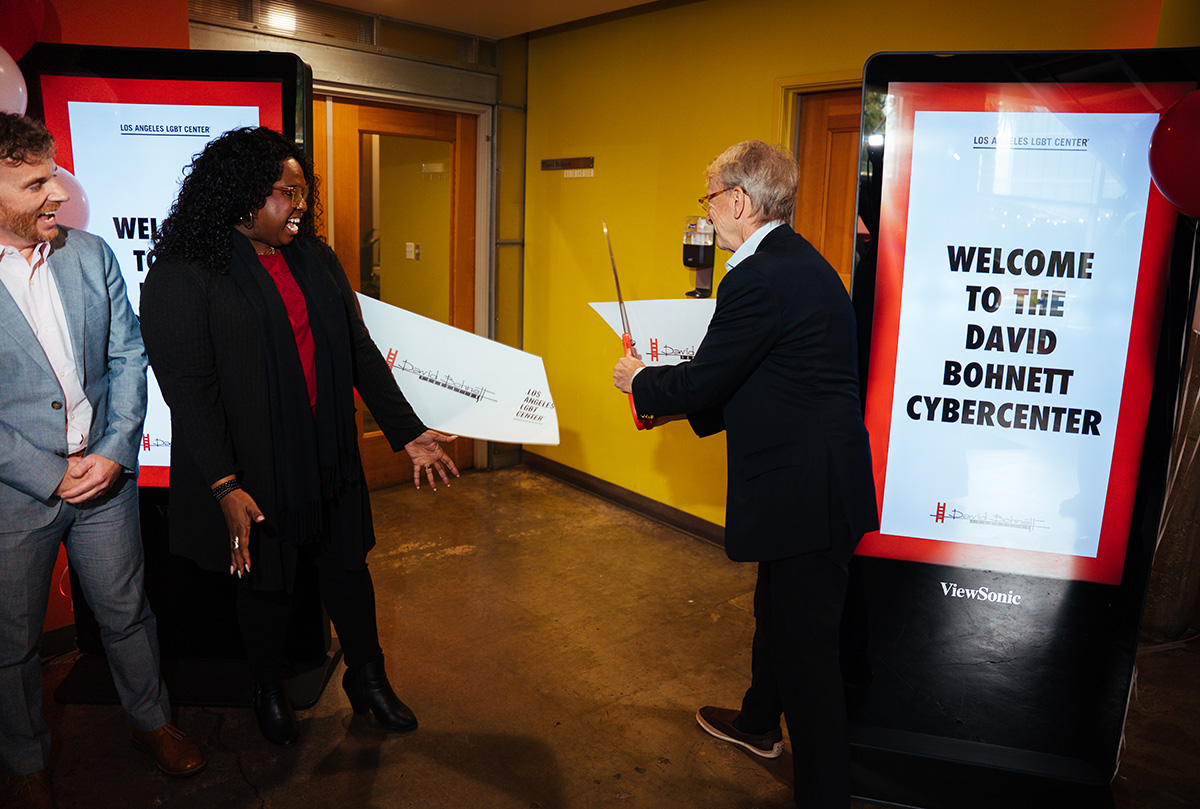
On Thursday, community leaders and advocates gathered at the Los Angeles LGBT Center for a joyous ribbon-cutting event that ushered in the organization’s revamped tech hub. For 27 years, the organization’s David Bohnett CyberCenter has provided local residents a safe space to utilize computers, printers, scanners, and attend workshop opportunities to build their tech literacy skills, stay connected, discover joy, and research important opportunities.
Here, individuals can safely surf the web, complete online benefits and services forms, apply for jobs, as well as make progress towards educational programs. It’s a safe space where LGBTQ+ community members can reliably use technology that can provide them with vital avenues into improving and living their lives.
The CyberCenter is funded by the David Bohnett Foundation, which provides grants to various LGBTQ+ initiatives and social programs nationally in order to improve equity for different marginalized communities. In 1998, the foundation established its first tech hub at the Los Angeles LGBT Center, so that queer community members would not be shut away as technological advancements made online access increasingly necessary. “The idea was simple but urgent,” Bohnett said at yesterday’s ceremony. “[It was meant] to ensure that LGBTQ+ people had access to the technology that could open doors to education, employment, and connection.”
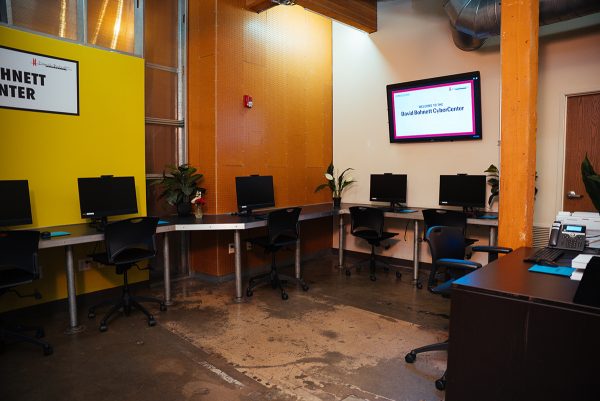
Yesterday, this CyberCenter’s updated facilities were welcomed with warm applause, cheer, and a celebratory banner that was cut by Bohnett himself. It marked an evolving growth towards the foundation and the Center’s shared commitment to the hub’s initial promise: to guarantee equitable technological access to the county’s queer residents.
“Our community members regularly share how missing even one piece of access—a computer, a quiet place to work, a stable connection—can stall their progress,” said Sydney Rogers, senior program manager at the Trans Wellness Center. “For so many, technology isn’t just a tool—it’s the gateway to opportunity. Résumés, job searches, online trainings, interview prep—all of it depends on having access to reliable equipment and an environment where people feel safe and supported.”
For Bohnett, what began as a room with a “handful of computers” has grown into over 60 CyberCenters nationwide — and they are all “rooted in the belief that digital access is not a luxury, but a lifeline,” said Bohnett. “Every time I’m back here, I’m reminded that the Los Angeles LGBT Center was the first to bring that vision to life.”
The David Bohnett CyberCenter is open from Tuesdays to Thursdays, from 10 a.m. to 1 p.m., and from 2-5 p.m. More information about its location and services can be found here.
Los Angeles
This queer, Latine-led organization is protecting residents against SNAP cuts and immigration raids
The weeks-long delay in SNAP benefits left food insecure residents stranded. Community centers like Mi Centro worked to help them.
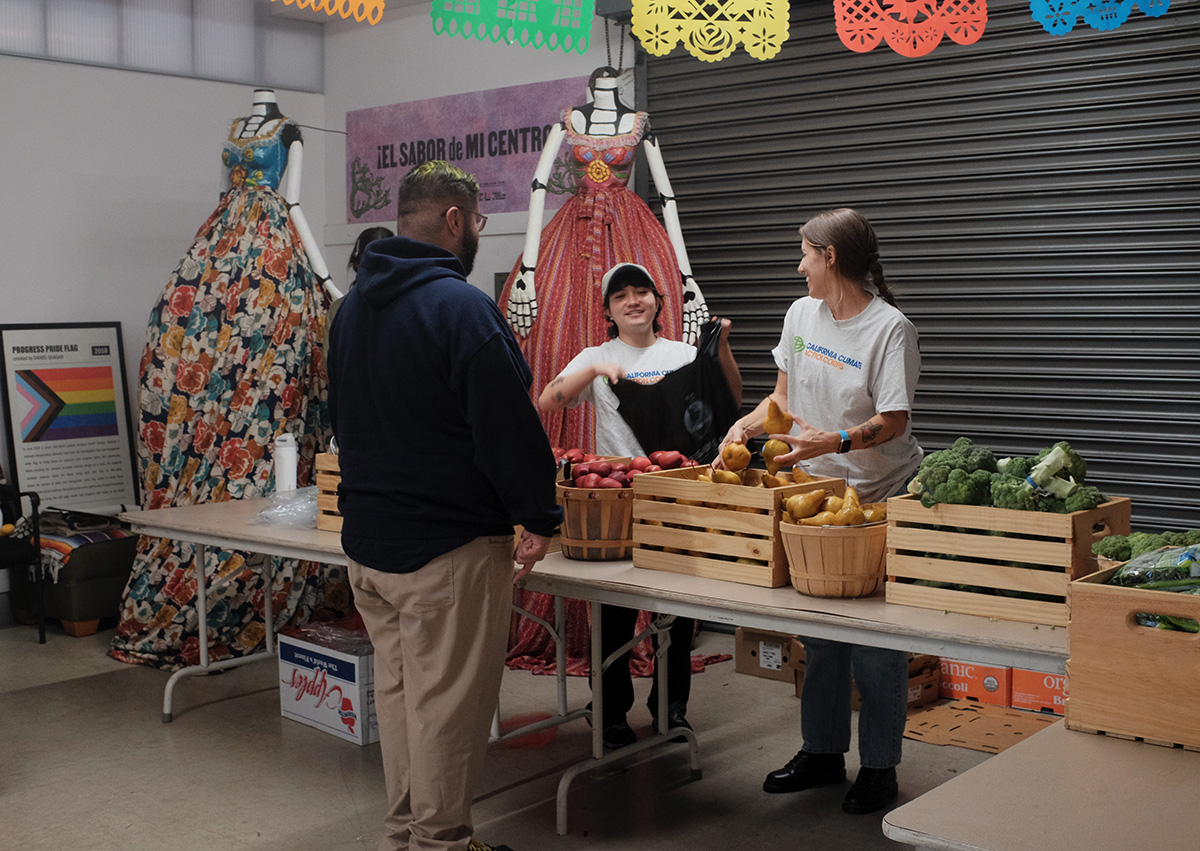
Light rain and mist loomed over the quiet Boyle Heights Neighborhood on Friday morning as residents made their way towards a free farmer’s market at Mi Centro, a community center on South Clarence Street. There, they were greeted with a warm“buenos días” by program coordinator Norma Sánchez and guided into an adjacent room with crates of fresh produce and a table with mental health resources.
Created in collaboration with team members from both the Los Angeles LGBT Center and the Latino Equality Alliance, Mi Centro doubles as a hub for information and resources as well as a sanctuary of respite and comfort for its Latine community members. It provides immigration services, legal clinics, housing rights panels, and a monthly free farmers’ market. This November, Mi Centro has organized an additional market with the support of collaborating organizations, including food justice ministry Seeds of Hope, to step up for community members after SNAP benefits were cut at the beginning of the month.
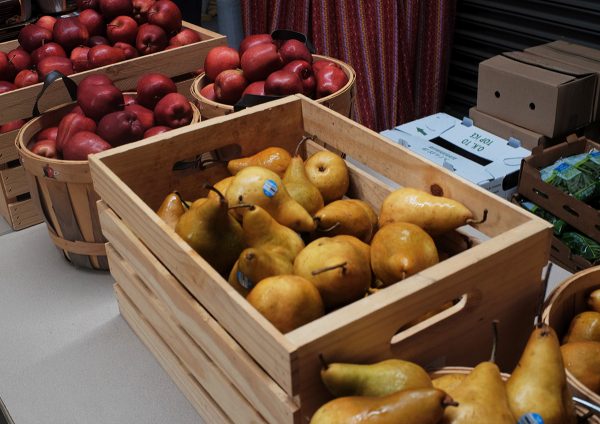
Combined with the increased presence of federal immigration agents in the county since June, this cut in essential funding has created additional strain for local Latine community members when it comes to accessing food and feeling safe when stepping outside. For staff members at Mi Centro, these issues impact the livelihoods and safety of the people and spaces most familiar and important to them. “This is the community where my family immigrated to,” Caín Andrade, Mi Centro’s program manager, told the Blade. “Now I feel like it’s not only my duty, but my pleasure and my privilege to come back to the same community and help.”
At Friday’s market, Andrade noted that it yielded one of the “biggest turnouts” despite the weather, and explained that Mi Centro has seen a steady increase in the need for food and resource assistance in the last couple of months. Several community members showed up to access groceries and look through the other resource tables at the market. One of these tables included information about benefits and insurance enrollment, and another included pamphlets from local health nonprofit QueensCare about free health screenings. All written materials were provided in both Spanish and English, and Sánchez made sure to speak with each resident about their needs.
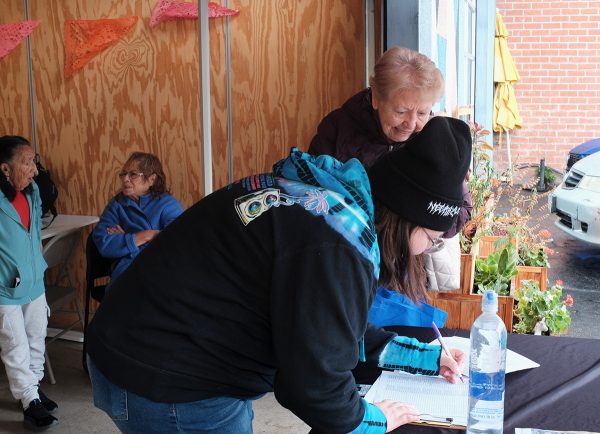
“We really curated Mi Centro as a community center where people can feel like they belong,” said Andrade. “[We] provide a space that feels a little bit more like home to them: that’s warm, that’s got flowers and art, a couch to sit on, and just have somebody that listens to you — somebody that can speak Spanish and give them the opportunity to articulate what they’re going through in their language. We can see the sighs of relief.”
Andrade also emphasizes the intergenerational teamwork that happens at Mi Centro: a synergy that is guided by “young, queer Latino community” voices that have been embedded within the neighborhood. Mi Centro’s queer staff are deeply shaped by these communities that have long been home to them — and they, in turn, are shaping these spaces to be more inclusive: where LGBTQ+ visibility is embraced and cherished.
With a team that “represents the entire rainbow,” residents see the advocates working to support them as “our kids, our nephews, our grandkids,” Andrade said. “We are equally protective of them. We want to make sure that they are being given access to everything that other communities might have easy access to.”
Mi Centro’s next free farmer’s market takes place on Friday, Nov. 21st. More information can be found here.
Los Angeles
LA Assessor Jeffrey Prang to be honored by Stonewall Democrats
Prang is among America’s longest-serving openly gay elected officials
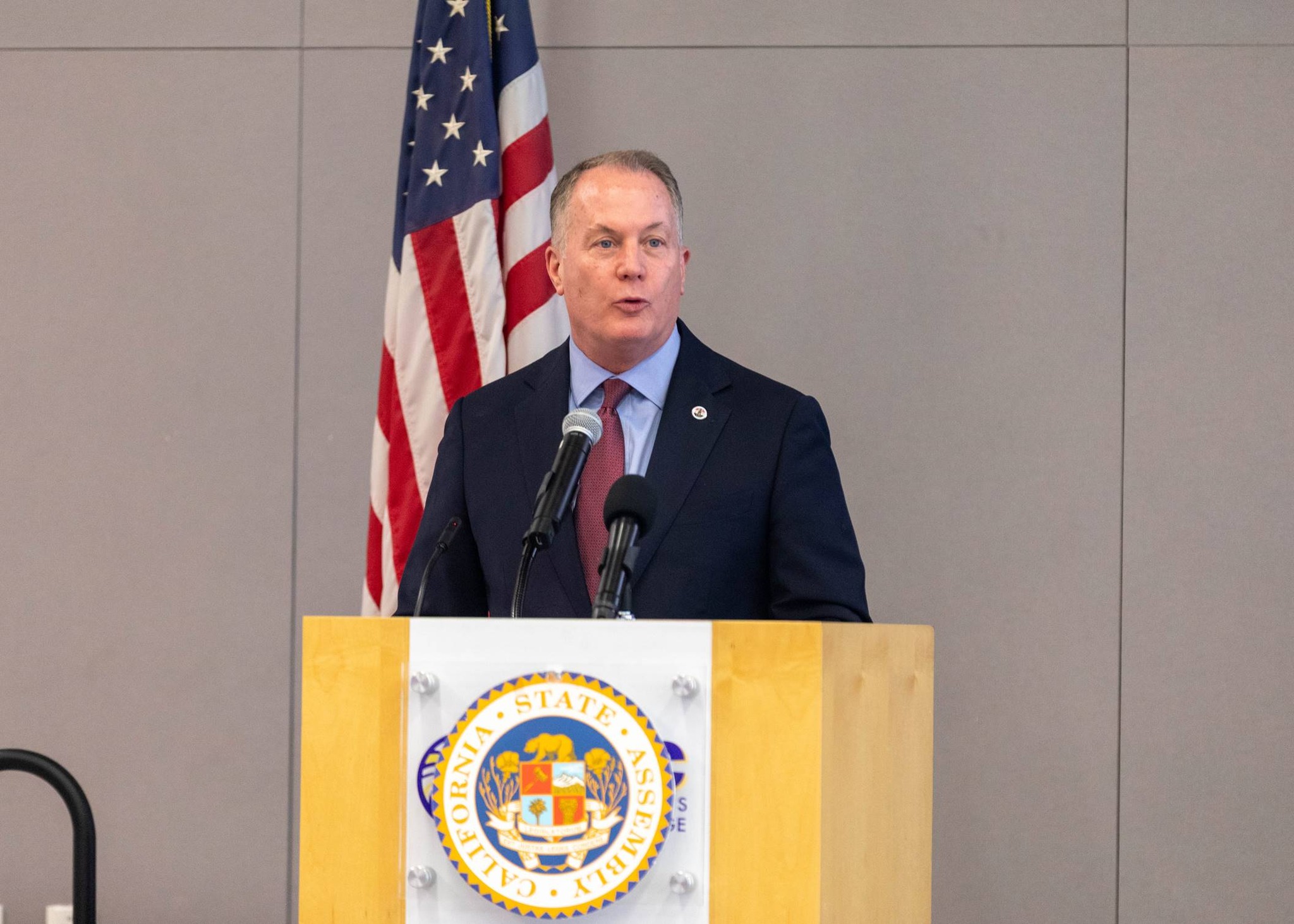
You may not be too familiar with LA County Assessor Jeffrey Prang. You’ve probably never heard of the office of the LA County Assessor, or you might only have a vague notion of what it does.
But with a career in city politics spanning nearly thirty years, he’s among the longest-serving openly gay elected officials in the United States, and for his work serving the people of Los Angeles and championing the rights of the city’s LGBTQ people, the Stonewall Democratic Club is honoring him at their 50th Anniversary Celebration and Awards Night Nov 15 at Beaches Tropicana in West Hollywood.
Prang moved to Los Angeles from his native Michigan after college in 1991, specifically seeking an opportunity to serve in politics as an openly gay man. In 1997, he was elected to the West Hollywood City Council, where he served for 18 years, including four stints as mayor.
“I was active in politics, but in Michigan at the time I left, you couldn’t really be out and involved in politics… My life was so compartmentalized. I had my straight friends, my gay friends, my political friends, and I couldn’t really mix and match those things,” he says.
“One of the things that was really impactful was as you drove down Santa Monica Boulevard and saw those rainbow flags placed there by the government in the median island. That really said, this is a place where you can be yourself. You don’t have to be afraid.”
One thing that’s changed over Prang’s time in office is West Hollywood’s uniqueness as a place of safety for the queer community.
“It used to be, you could only be out and gay and politically involved if you were from Silver Lake or from West Hollywood. The thought of being able to do that in Downey or Monterey Park or Pomona was foreign. But now we have LGBTQ centers, gay pride celebrations, and LGBT elected officials in all those jurisdictions, something that we wouldn’t have thought possible 40 years ago,” he says.
Prang’s jump to county politics is emblematic of that shift. In 2014, amid a scandal that brought down the previous county assessor, Prang threw his name in contention for the job, having worked in the assessor’s office already for the previous two years. He beat out eleven contenders in the election, won reelection in 2018 and 2022, and is seeking a fourth term next year.
To put those victories in perspective, at the time of his first election, Prang represented more people than any other openly gay elected official in the world.
Beyond his office, Prang has lent his experience with ballot box success to helping get more LGBT people elected through his work with the Stonewall Democrats and with a new organization he co-founded last year called the LA County LGBTQ Elected Officials Association (LACLEO).
LACLEO counts more than fifty members, including officials from all parts of the county, municipal and state legislators, and members of school boards, water boards, and city clerks.
“I assembled this group to collectively use our elected strength and influence to help impact policy in Sacramento and in Washington, DC, to take advantage of these elected leaders who have a bigger voice in government than the average person, and to train them and educate them to be better advocates on behalf of the issues that are important for us,” Prang says.
“I do believe as a senior high-level official I need to play a role and have an important voice in supporting our community,” he says.
Ok, but what is the LA County assessor, anyway?
“Nobody knows what the assessor is. 99% of people think I’m the guy who collects taxes,” Prang says.
The assessor makes sure that all properties in the county are properly recorded and fairly assessed so that taxes can be levied correctly. It’s a wonky job, but one that has a big impact on how the city raises money for programs.
And that wonkiness suits Prang just fine. While the job may seem unglamorous, he gleefully boasts about his work overhauling the office’s technology to improve customer service and efficiency, which he says is proving to be a role model for other county offices.
“I inherited this 1970s-era mainframe green screen DOS-based legacy system. And believe it or not, that’s the standard technology for most large government agencies. That’s why the DMV sucks. That’s why the tax collection system sucks. But I spent $130 million over almost 10 years to rebuild our system to a digitized cloud-based system,” Prang says.
“I think the fact that my program was so successful did give some impetus to the board funding the tax collector and the auditor-controller to update their system, which is 40 years behind where they need to be.”
More tangible impacts for everyday Angelenos include his outreach to promote tax savings programs for homeowners, seniors, and nonprofits, and a new college training program that gives students a pipeline to good jobs in the county.
As attacks on the queer community intensify from the federal government, Prang says the Stonewall Democrats are an important locus of organization and resistance, and he encourages anyone to get involved.
“It is still an important and relevant organization that provides opportunities for LGBTQ people to get involved, to have an impact on our government and our civic life. If you just wanna come and volunteer and donate your time, it provides that, if you really want to do more and have a bigger voice and move into areas of leadership, it provides an opportunity for that as well,” he says.
Los Angeles
SNAP benefits remain delayed — local leaders are creating their own solutions
Assemblymember Mark González has announced a $7.5 million partnership with the YMCA’s FeedLA food distribution program.
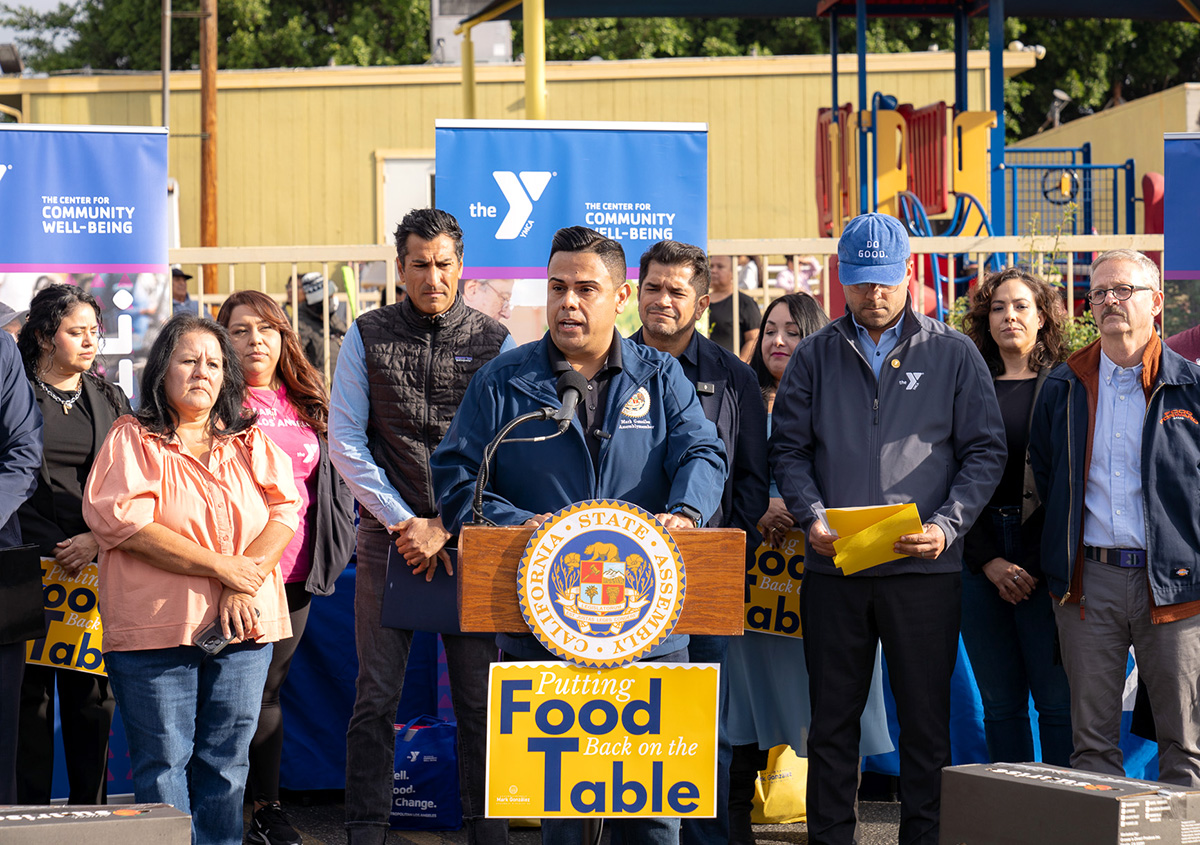
Today marks the 37th day of the current government shutdown, the longest witnessed in the country’s history. As a result, people who receive federal Supplemental Nutrition Assistance Program (SNAP) benefits have not received their monthly aid for November. In Los Angeles, over 1.5 million people rely on these funds to purchase groceries.
On Oct. 28th, Governor Gavin Newsom announced that California joined over 20 other states in suing the administration over its “unlawful refusal” to provide SNAP aid even though it has the funds to do so. Two federal judges ruled in favor of the lawsuit, though when and how much aid will be distributed remains inconclusive.
At a press briefing on Tuesday, White House press secretary Karoline Leavitt stated that the administration is “fully complying” with the court order. “The recipients of the SNAP benefits need to understand: it’s going to take some time to receive this money because the Democrats have forced the administration into a very untenable position,” Leavitt continued. “We are digging into a contingency fund that is supposed to be for emergencies, catastrophes, for war.”
On Wednesday morning, local leaders in Los Angeles held their own press conference at the Weingart East Los Angeles YMCA to denounce the administration’s inaction and to discuss alternative efforts that are trying to fill the gap as SNAP aid remains suspended. “We’re here today because the federal government has turned its back on millions of families, and we refuse to stay silent,” said District 54 Assemblymember Mark González. “This is more than a press conference. This is a plea for sanity, a demand for humanity, and a call to action…California is stepping up to do what Washington will not, and that’s to feed our people.”
Alongside a number of other local leaders and advocates, including Assemblymember Jesse Gabriel, Speaker of the California State Assembly Robert Rivas, Boyle Heights community leader Margarita “Mago” Amador, Congressman Jimmy Gomez, YMCA president Victor Dominguez, and Food Forward founder Rick Nahmias, González announced a partnership with the YMCA’s FeedLA program. $7.5 million has been secured to fund food distribution efforts across the county’s 29 YMCA sites.
Residents do not need to have a YMCA membership to take part. Resources like groceries, warm meals, and home deliveries will be available at various times throughout the week. There are currently no weekend distribution dates listed.
This announcement comes in the midst of other local efforts bolstering on-the-ground SNAP relief. On Tuesday, the Los Angeles County Board of Supervisors approved a motion that will strengthen the Office of Food Systems (OFS), a partnership between county leaders and local philanthropic organizations aiming to create equitable food systems for residents. The motion would establish deeper connections between OFS and all County departments, as well as strengthen state and federal food policy coordination.
The county has also funded a $10 million contract with the Los Angeles Regional Food Bank, which will allow the organization to purchase more produce and create additional pantry and food distribution pop-up sites.
For many, these solutions offer a temporary landing pad as they hold out for their benefits to be reinstated. “Food pantries are not just places where a bag of food is handed out. They are a bridge of hope for our most vulnerable communities,” said Amador, at Wednesday’s press conference. “When a family comes to a pantry, many times they don’t just bring an empty bag. They also bring worries, stress and [the] fear of not being able to feed their children. They leave with a bag of food [and] they take with them a bit of dignity, relief, and a feeling that they are not alone.”
Los Angeles
Queer communities will face disproportionate harm when SNAP ends
The Blade spoke with researchers, local leaders and food distribution organizers to discuss the impact on LGBTQ+ people
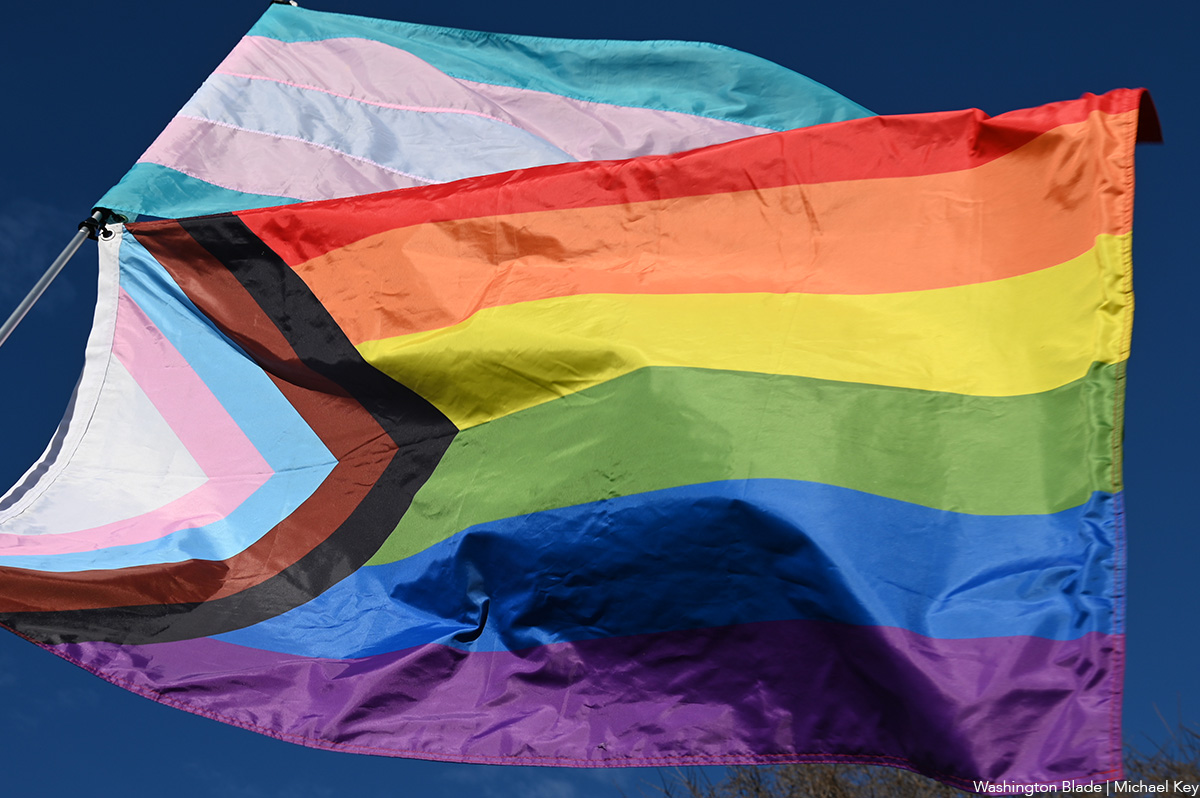
On Oct. 1st, the previous federal budget expired, and the government entered a shutdown after being unable to reach an agreement on how different government services would be funded moving forward. Namely, democratic officials are arguing for more affordable healthcare as well as a reversal of President Trump’s cuts to Medicaid and health agencies, as proposed in H.R. 1 — otherwise known as the “One Big Beautiful Bill Act.” Without a compromise that Trump will agree to, several essential federal services remain stalled.
Now, the federal Supplemental Nutrition Assistance Program (SNAP), formerly known as food stamps, will be indefinitely halted beginning Nov. 1st. This affects over 1.5 million Los Angeles residents who rely on CalFresh, the state’s equivalent of SNAP. BenefitsCal, the portal Californians can use to access and manage benefits that include food assistance, announced on Oct. 27th that “the U.S. Department of Agriculture (U.S.D.A.) is not sending money to states for November CalFresh (SNAP) benefits. This means your county cannot add money to your EBT card until federal funding is restored.”
For LGBTQ+ community members, this impact will be particularly damaging.
Over 665,000 LGBTQ+ adults live in Los Angeles County, and 32% of this population reported experiencing food insecurity from 2023 to 2024, according to data analysis completed by researchers at the Williams Institute. In comparison, 23% of non-LGBTQ+ adults reported experiencing food insecurity.
“I think it’s important to realize that many people who are on SNAP are either disabled and can’t work, or they’re caretaking for young children — and those tend to be the groups of people in the LGBTQ community,” Brad Sears, the Rand Schrader Distinguished Scholar of Law and Policy at the Williams Institute, told the Blade. “Over 60% of LGBTQ people on SNAP are disabled, and about 46% are raising children…There aren’t a lot of options for them in meeting their basic needs, [like] providing food for themselves and their families, besides SNAP benefits.”
How can LGBTQ+ community members access food assistance in November?
Sears pointed out how, in times of social struggle, queer communities have turned to each other for support. He states that it is important, now more than ever, for local organizations and food distribution programs to stand in solidarity with LGBTQ+ people — many of whom face barriers to seeking resources due to various factors like the fear of discrimination. “This is an important time to send that message that they are inclusive, that their services are inclusive, and that everyone, including LGBTQ people, are welcome to access their resources,” Sears told the Blade.
The Hollywood Food Coalition is one of these spaces. The organization rescues and redistributes food through a community exchange program, and also provides hundreds of dinners to community members every day of the year. “We are open to anyone hungry. We’re proud to serve many LGBTQ+ guests and to offer a welcoming space where everyone can share a meal and feel safe, seen, and cared for,” Linda Pianigiani, the organization’s interim director of development, told the Blade.
The Los Angeles LGBT Center is also partnering with food justice organization Seeds of Hope to provide more free farmers’ markets this upcoming month. For Giovanna Fischer, the Center’s chief equity officer, this is an opportunity to champion intersectional queer empowerment in the midst of the administration’s actions. For marginalized community members, including those who are trans, disabled, or immigrants, organizers are thinking about multidimensional approaches as they support community members through crises like the indefinite end to SNAP benefits.
“Now we’re looking at an issue [that can be] compounded three times simply because of who that person is and the experience that they have in their life,” Fischer told the Blade. “There’s no single-issue analysis of anything that’s coming up for our community, because we’re not living single-issue lives…How are we thinking through things in a layered way to ensure that people with these intersectional identities have access to the things that they need?”
How is the state and county responding?
On Tuesday, Governor Newsom announced that California is joining 20 other states in suing the administration for its “unlawful refusal” to continue funding SNAP. Los Angeles County Supervisor Lindsey Horvath also stated in a press release that the county is working to fund a $10 million contract with the Los Angeles Regional Food Bank to expand food purchasing capabilities and create more food assistance pop-up sites and community pantry locations.
L.A. Care Health Plan is also investing up to $5.4 million to fund countywide food security and distribution efforts, as well as provide aid to nonprofit organizations that distribute fresh produce.
The limitations we’re facing
While these efforts are instrumental in delivering necessary food aid in SNAP’s absence, Sears is worried about the long-term strain the suspension of federal food assistance will have on LGBTQ+ communities and the organizations trying to support them. “A number of state and local governments are going to try to temporarily fill the gap, but…the resources to do that will likely be overwhelmed without SNAP benefits,” Sears told the Blade. “Nonprofit organizations are already feeling the pressure of funding cuts from the Trump administration.”
Pilar Buelna, chief operations officer of the Hollywood Food Coalition, is seeing this pressure in real time. She notes that the increase in the need for local food assistance has been growing since the summer, and will only continue to grow with the quickly-approaching end to SNAP benefits. “Yesterday, actually, we ran out of food,” Buelna told the Blade, after the coalition gave out 300 meals but were still met with individuals in need of food. “We are concerned that the need is going to increase so much that we’re not going to be able to keep up…We are sending out a call to action to the community to donate food and funding. We need [these] to continue our operations.”
The Blade will be shadowing various food distribution programs and efforts throughout November to track the impact of the end of SNAP on queer Angelinos, and the community-led efforts being organized to support them.
Los Angeles
Anger, resistance and unity coursed through L.A. City Hall “No Kings” protest
The Blade photographed Saturday’s demonstration as thousands mobilized and marched
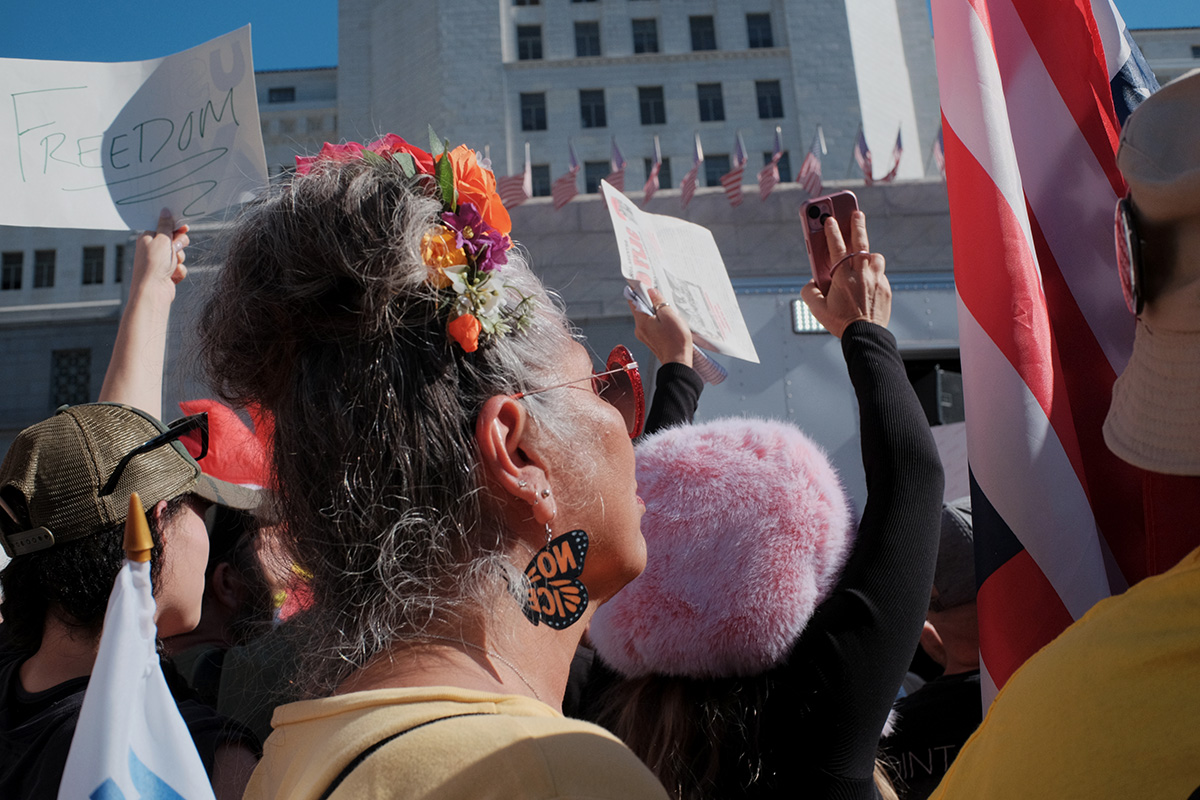
On Oct. 18th, a mosaic of Angelinos across generations and cultural backgrounds gathered outside of city hall as they proudly lifted handmade signs decrying President Trump and the current administration. This march was one of several rallies organized just within the city, and one of thousands others organized across the nation.
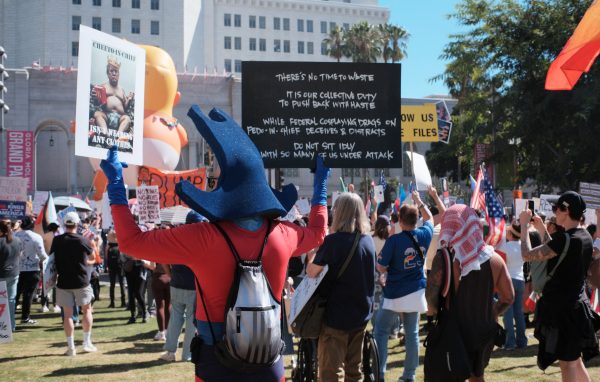
The protest was packed, with people standing nearly shoulder to shoulder as a number of local leaders including Black Women for Wellness Action Project policy analyst LaKisha Camese, TransLatin@ Coalition president Bamby Salcedo and Assemblymember Isaac Bryan, made rousing speeches and led passionate chants before the march began. Speakers like political commentator Brian Tyler Cohen did not hold back when they addressed the crowd. “[They are] so desperate to rebrand this thing as a ‘Hate America’ rally. But do you know what hating America looks like?,” asked Cohen.
Image captures by Blade reporter Kristie Song
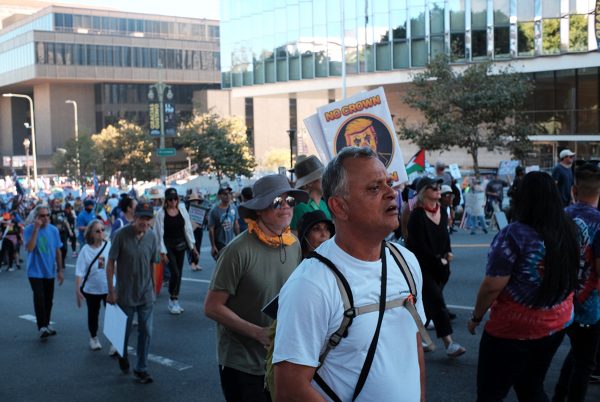
“It looks like sending secret police accountable to no one into our cities…It looks like keeping the government closed because you are so hell bent on stripping away health care from 24 million Americans and trying to get their costs to double, triple or quadruple. So if you’re looking for the ‘Hate America’ rally, might I suggest the White House.”
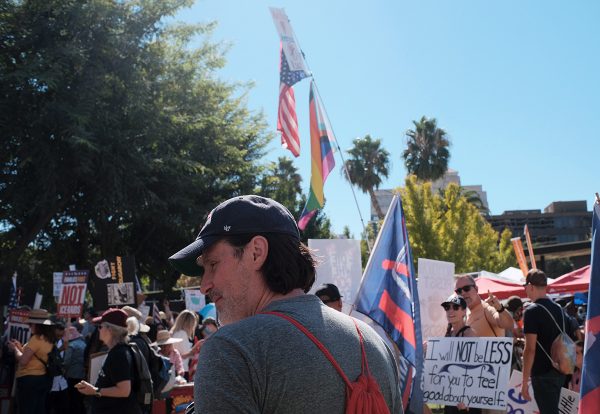
Protestors cheered at the top of their lungs with each passing speech, and each clear and explicit denouncement of the current administration. “There’s no rally like what’s happening here in Los Angeles,” said Assemblymember Bryan. “This is where Black, brown, poor, indigenous, everyday people come together…Washington D.C. doesn’t care about us, and we know that. But, we care about each other, don’t we? We believe that health care is a human right, don’t we? We believe that housing is a human right, don’t we? We will stand up to authoritarianism, won’t we? Because when we fight together, what happens? We win!”
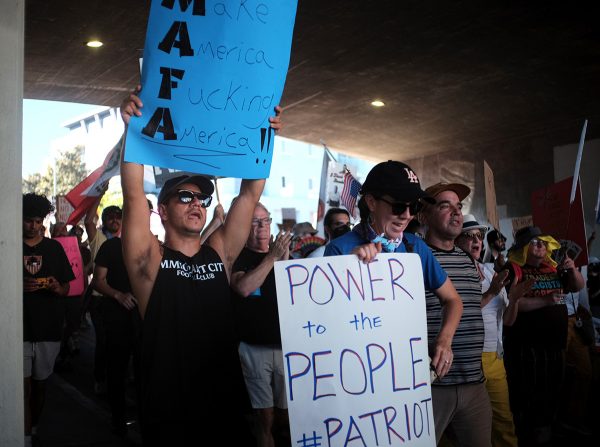
As people began to grow restless, the march finally began, taking them to a highway overpass.
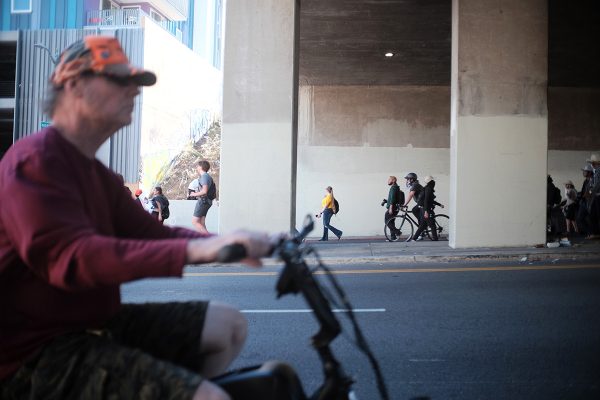
As residents boarded a bus at Cesar E. Chavez and Broadway, they were halted by blocked roads as large congregations marched by. Transit riders looked on into the crowds, their faces mere inches from some of the passing protestors. Separated by a layer of window glass, one nodded along as protestors lifted their signs above their heads and chanted “ICE out of LA!” Some waved to people inside the stalled bus, inviting solidarity from those who weren’t marching alongside them.
When the road cleared, their calls could still be heard for a little longer.
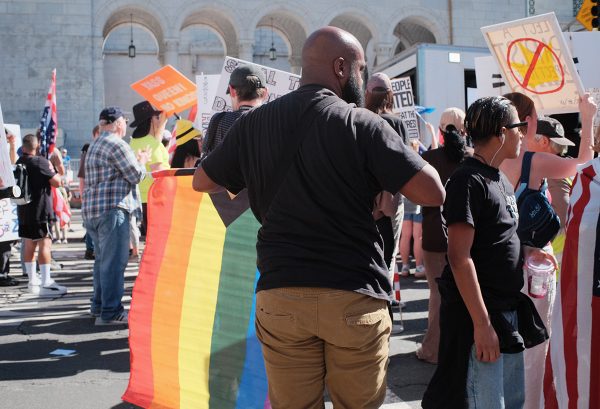
-
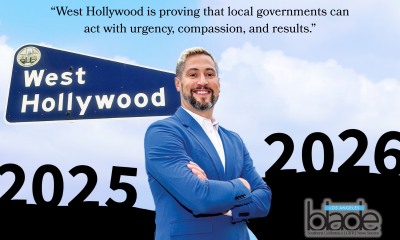
 Commentary5 days ago
Commentary5 days agoLooking back on ’25. Looking forward to ’26.
-
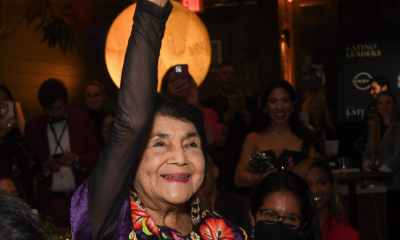
 Features4 days ago
Features4 days agoLegendary organizing activist Dolores Huerta, 95, rides in AHF’s ‘Food for Health’ Rose Parade float
-

 Commentary4 days ago
Commentary4 days agoNew Year, New Queer: A polite reminder of the traditions that many of us make and many of us break that are well worth revisiting this particular year
-
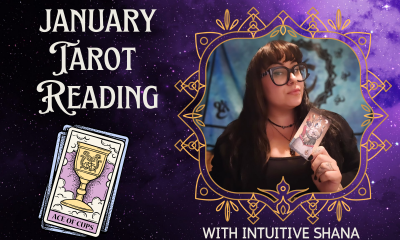
 Tarot Readings and Astrology3 days ago
Tarot Readings and Astrology3 days agoJanuary is calling for us to be grown-ups in Intuitive Shana’s New Year tarot reading
-

 Books2 days ago
Books2 days agoA look back at the best books of 2025
-

 Parks & Recreation5 days ago
Parks & Recreation5 days agoFor more than two decades, Los Angeles Neighborhood Land Trust has worked to address park inequities
-

 LGBTQ+ Youth Mental Health2 days ago
LGBTQ+ Youth Mental Health2 days agoLaw expanding mental health resources for LGBTQ+ youth has gone under effect
-

 Television20 hours ago
Television20 hours agoThe ‘Stranger Things’ coming out scene: The reaction and the relevance




